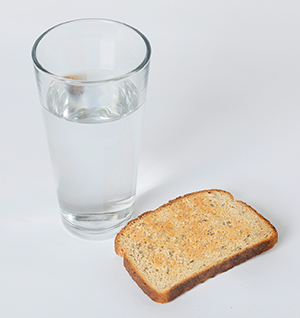Cancer Care: Controlling Diarrhea
A common side effect of cancer and cancer treatment is diarrhea. This is when you have loose, watery stools or pass stool more often than usual. There are many things that can cause diarrhea, such as:
If not controlled, diarrhea can cause you to quickly become dehydrated. It can also change the balance of nutrients and minerals in your body. Be sure to tell your healthcare provider about any changes in your bowel habits. You may need treatment.
Tips for controlling diarrhea
These steps can help you keep diarrhea from getting worse:
-
Limit the amount of fiber in your diet. Don't eat high-fiber foods such as whole-grain bread and brown rice. Instead, eat white bread and rice.
-
Eat foods rich in potassium, such as bananas, apricots, and potatoes. This can help replace potassium lost due to diarrhea.
-
Eat small, frequent meals that are easy to digest. Try the BRAT diet: bananas, white rice, applesauce, and toast.
-
Drink plenty of fluids. Water, juice, sports drinks, and flat light sodas, like ginger ale, are best. They can help replace fluids lost due to diarrhea.
-
Stay away from coffee, tea, and alcohol.
-
Don't eat foods that are fried, greasy, spicy, or sweet.
-
Limit milk products and how much milk you drink if these seem to make diarrhea worse.
 |
| For breakfast, try eating toasted white bread and a banana. |
Medicines can help
Ongoing diarrhea is not something you have to live with. And it can become harmful. Talk with your healthcare provider about:
-
Your risk for diarrhea
-
If any of the medicines you're taking could cause diarrhea
-
What you can do to help prevent it
-
What you should do if it starts
You may be given medicine to stop diarrhea or help keep it from starting. Use it as directed. Your healthcare provider may also suggest that you:
Don’t take any over-the-counter products without checking with your healthcare provider first.
When to call your healthcare provider
See your healthcare provider if any of these happen:
-
The diarrhea lasts more than 24 to 48 hours.
-
There is blood in your stool or when you wipe.
-
You have new swelling, cramps, or pain in your belly.
-
You become lightheaded or dizzy.
-
Your urine turns very dark or you stop passing urine.
-
The medicine you were given to stop diarrhea isn't working.
Online Medical Reviewer:
Kimberly Stump-Sutliff RN MSN AOCNS
Online Medical Reviewer:
L Renee Watson MSN RN
Online Medical Reviewer:
Preeti Sudheendra MD
Date Last Reviewed:
1/1/2022
© 2000-2025 The StayWell Company, LLC. All rights reserved. This information is not intended as a substitute for professional medical care. Always follow your healthcare professional's instructions.